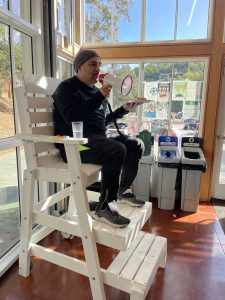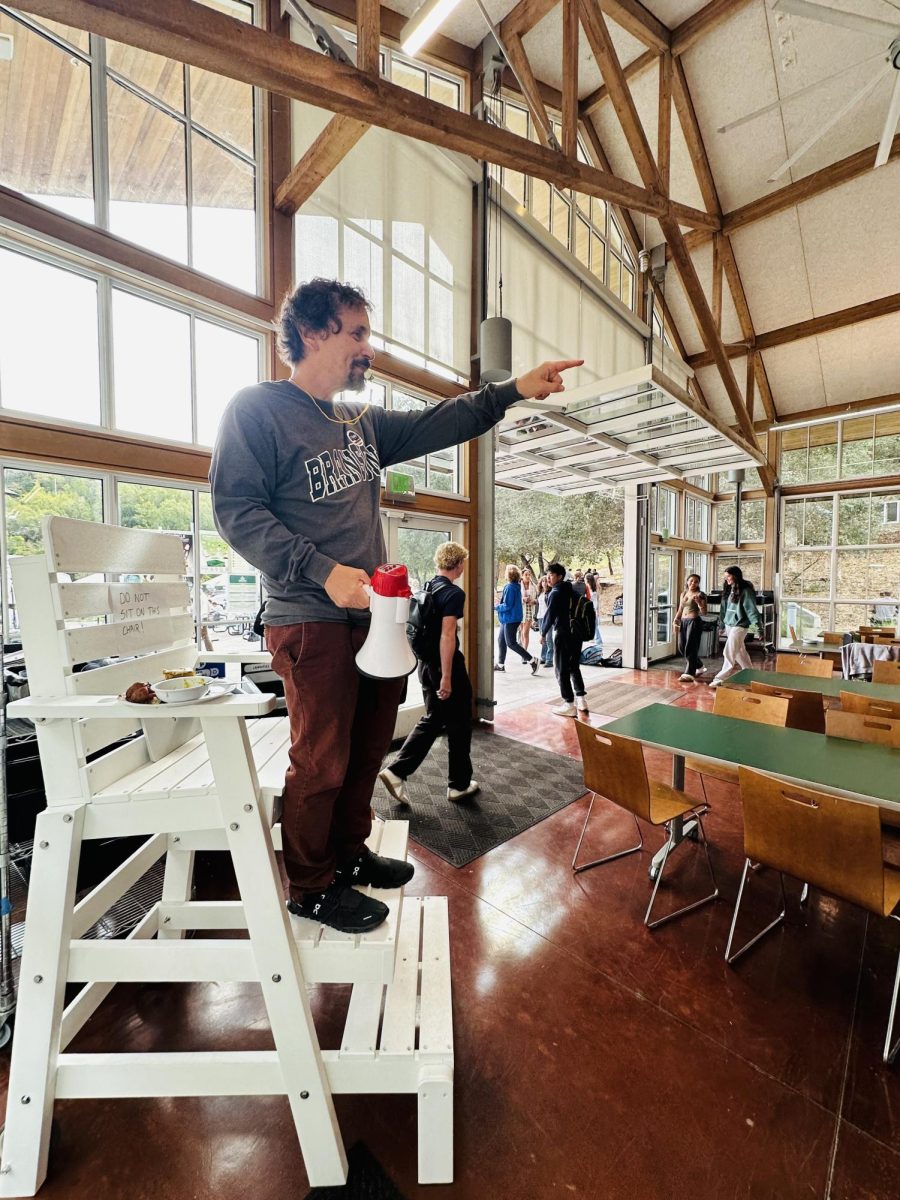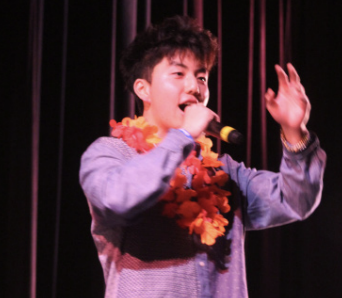Described as “the hill I’m gonna die on,” “one of the biggest bees in my bonnet” and “my albatross” by Branson faculty, commons cleanliness is a topic of strong tension between students and staff.
Whether students think Branson faculty and staff are being dramatic, the question of how to keep the commons clean has become central to campus life.
This year brought the opposite approach to last year’s incentives system to encourage students to clean up their food: revoked privileges — no Wednesday dessert, threats to wing day — and a lifeguard chair.
As part of Student Senate’s incentives system last year, every day that students could keep the commons clean would be added to their streak, and prizes would follow streak achievements. Prizes would start with the return of muffins after day 10 and possibly lead to a new ice cream machine. If the commons wasn’t clean one day, the streak would go back to zero.
Student Body Co-President Mo Jacoby explained why that system didn’t work.
“Once it failed, there was no reviving it,” he said. “Once you got up to 20-something and then it failed, no one wanted to start from zero again. I’m kind of glad that they did that first, so we could see if that worked or not. But after not working, we decided giving privileges isn’t working, so the only other way to go is to take privileges.”
The first thing to go was the Wednesday dessert, but that decision didn’t come from the Senate or administration. It came directly from the kitchen. Assistant Head of School and Dean of Faculty Jeff Symonds sees this as the kitchen’s final straw.
“That just tells you how it’s easy for people to lose patience,” Symonds said. “That means Marcus [Trigg] and his crew were out there for an extra 45 minutes cleaning up one too many days.”
Director of Culinary Services Marcus Trigg said revoked dessert “was a consequence of not cleaning up after yourselves. The goal is to see if we can get people cleaning up after themselves and once we can do that consistently, we can bring dessert back.”
The kitchen might start removing other items from the menu if students don’t clean up.
“If the dessert doesn’t work, then I was going to have to take away chicken wings,” Trigg said.
Trigg said the commons messiness reflects poorly on him and his kitchen crew.
“From a person on the outside looking in, if I came in here and saw that the cafeteria was filthy and dirty, I would assume that the kitchen crew wasn’t doing what they’re supposed to be doing,” he said. “To have to [make all the food] and then have to clean up the tables afterwards is a lot to ask of a five-man crew.”
The college counseling office is also concerned about how the commons will be seen by visitors.“I think that [visitors] love the energy that is our lunch. I love the fact that we all eat in one space, adults, students, everybody. And I love that it’s a time full of joy. It can be a little embarrassing at times with how the space is left,” Matt Lane, director of college counseling, said.
Cleanliness isn’t only important for the sake of appearances and respect for the people who end up cleaning up the mess.
“The number one reason it’s important is because if we don’t keep it clean we get pests and rodents,” he said. “Bacteria can also grow on the tables from people not cleaning up after themselves. Some cause diseases and people can get sick.”
The state of the commons has seemed to improve since the lifeguard chair was implemented. Faculty and staff sit in the chair in the corner of the commons with a bullhorn and whistle to spot when kids leave a dirty table behind.
“The chair has paid immediate, extraordinary dividends,” Symonds said. “I would say, having sat in it for the first two days, what most people needed was the reminder to look back behind them. People would get up and leave their entire thing. I’d blow the whistle like, ‘You left your stuff,’ and they were surprised they had done that. I hope it was just norms and training, and everybody adding another 15 seconds of personal responsibility will take care of it. We’ll see.”

The goal is for everyone to always clean up their individual mess. If it’s part of everyone’s daily habits, the problem will be resolved. When that point is reached, dessert should come back and we will not have lost a wing day. There is currently no set time or standard for when the commons will be considered clean enough, though.
“I just need to see a track record of seeing it clean and knowing that you guys actually care,” said Trigg. “It’s one thing to say ‘I’ll clean it up just to get dessert back,’ and then once we get dessert back it reverts to how it was before.”
Jacoby thinks the community could get privileges back “when all that’s left [on the tables] is the napkins.”
“I think if we could get two weeks in a row of almost-great, that would be my guess. But I can’t promise. We haven’t really discussed it,” he said.
To Jacoby, a clean table is one anyone can work at.
“People should be able to do homework at any part of the table without feeling like their paper’s going to get all gross,” he said.
Symonds thinks students simply have to bring the characteristics of other aspects of student life to their time in the commons.
“This is a profoundly respectful, smart, thoughtful group of students,” Symonds said. “They go to class, they do their homework, they say thank you, they push in their chairs, they turn out the lights. When it comes to food, they don’t bring any of the same attention to detail.”


